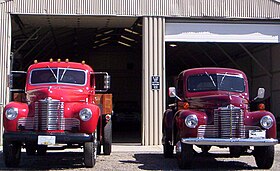International K and KB series
| International K and KB series | |
|---|---|
 | |
| Overview | |
| Manufacturer | International Harvester |
| Production |
|
| Body and chassis | |
| Class | Full-size pickup truck |
| Chronology | |
| Successor | International Harvester L series |
The International K and KB series are trucks that were produced by International Harvester, the first being the K introduced in mid 1940. In total there were 42 models, 142 different wheelbase lengths and load ratings ranging from 1/2 ton to 90,000 lbs.[1] They are best known for their durability, prewar design in a postwar era, and low price. The followup to the K, the KB, was introduced in 1947, with the characteristic difference being a widened lower grill appearing like "wings". Between 1947 and 1949 122,000 KB-1 and KB-2 trucks were sold.[2] The KB series was subsequently replaced by the L series.
K series

Models
The K models progress from 1 to 14 based upon the load capacity (K1 = half ton, K2 = 3/4 ton, K3 = 1 ton, etc.).
There are no K-9 or K-13 model trucks.
Light duty
Few differences exist between K-1 and K-2 models as they share most of their mechanical and chassis components. The rear axles in these two models are supported by a single roller bearing. Their differences in load rating are due to the K-2's stronger suspension.
The K-3 has a heavier frame, larger brakes, and rear axles supported by two roller bearings on a free floating rear end. The heavier duty K-4 has artillery-style wheels.
Heavy duty
The heavy duty K6 and larger use a center hinged butterfly hood rather than the rear hinged hood of the smaller trucks.
K6 and K7 share the same hood, fenders, and grill and use the smaller Blue Diamond engines.
K8 to K11 have a larger hood, fenders, and grill with fewer, but wider, grill bars. They use the larger FAB, Red, or RD series engines depending upon model year.
K12 has a longer hood to accommodate the larger Continental engine. They can either have the rounded nose common to the KB8 and larger or a flat nose grill.
K14 has flat top fenders rather than the rounded top of the smaller sizes.
Styling
The style of the truck involved headlamps that were integrated into the fenders. The hood opens alligator style. Heavy duty models (K6 and above) carried over the D-series cab and high crowned fenders.

KB series
For the KB-1 thru KB-5, chrome "wings" were added on the sides of the grill, a wrap-around chrome piece on the front hood, a hood ornament and chrome lettering indicating the model designation below the International nameplate on each side of the hood. For the KB-6 and larger trucks, the only external changes were that the Triple Diamond badge was moved to the top of the grille chrome-work, and the model designations were added to the hood-side chrome trim.[citation needed]
References
- ^ International Truck Color History: Tom Brownell and Patrick W. Ertel 1997
- ^ How stuff works: 1947-1949 International
Further reading
- Crismon, Fred W. (2001). International Trucks: 100 Years 1907-2007. Crestline. ISBN 978-0970056726.
- Foster, Patrick (2015). International Harvester Trucks, The Complete History. Motorbooks. ISBN 978-0-7603-4860-4.
External links
- A restored KB-14 at hankstruckpictures.com
- "Specifications International Model K-1". International Harvester. 1941.
{{cite journal}}: Cite journal requires|journal=(help) - "Specifications International Model KB-1". International Harvester. 1947.
{{cite journal}}: Cite journal requires|journal=(help) - "5 New Internationals". International Trails: 1–11. 1940.
